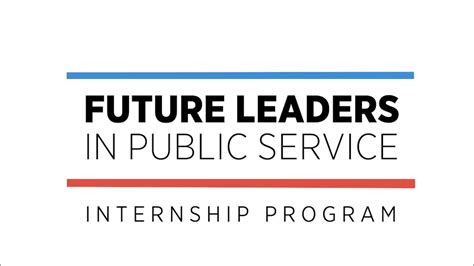In an era marked by complex societal challenges and a rapidly evolving technological landscape, the need for exceptional leadership in public service has never been more pressing. Future leaders must possess the vision, skills, and unwavering commitment to navigate these uncharted waters and steer our communities toward a brighter future.

Embracing Innovation and Technology
One of the hallmarks of future leaders in public service is their ability to harness innovation and technology to enhance service delivery and improve societal outcomes. By embracing digital transformation, these leaders can streamline processes, reduce inefficiencies, and provide citizens with more accessible and efficient experiences.
According to a study by the National Association of State Chief Information Officers (NASCIO), 72% of state government agencies have implemented cloud computing solutions, while 80% have adopted mobile technologies. This technological revolution empowers public servants to better connect with citizens, respond more effectively to emergencies, and drive evidence-based decision-making.
Fostering Collaboration and Partnerships
Future leaders in public service recognize the immense value of collaboration and partnerships. They understand that complex challenges cannot be solved by any single entity acting alone. By fostering intergovernmental partnerships, engaging with non-profit organizations, and leveraging private sector expertise, these leaders can amplify their impact and deliver more effective solutions.
A recent report by the Urban Institute highlights the benefits of intergovernmental collaboration in addressing homelessness. The report found that cities that prioritize partnerships with other levels of government, as well as with non-profit organizations, were able to reduce homelessness by up to 50%.
Cultivating Emotional Intelligence and Empathy
Exceptional public servants are not just technically proficient; they also possess a high degree of emotional intelligence and empathy. These qualities enable them to connect with citizens on a human level, understand their needs, and respond with compassion and understanding.
According to a study by the Pew Research Center, 77% of Americans believe that public servants should be more compassionate and empathetic. By fostering these qualities, future leaders can create a more inclusive and equitable society where everyone feels valued and supported.
Strategies for Developing Future Leaders
To cultivate a generation of future leaders in public service, concerted efforts are required from government agencies, educational institutions, and non-profit organizations. Here are some effective strategies:
Mentoring and Coaching
Provide experienced public servants with opportunities to mentor and coach emerging leaders. This mentorship can provide invaluable guidance, support, and insights into the complexities of public service.
Leadership Development Programs
Establish specialized leadership development programs that equip future leaders with the necessary skills and knowledge to succeed in their roles. These programs should focus on areas such as strategic planning, communication, and stakeholder management.
Internships and Fellowships
Offer internships and fellowships that provide hands-on experience in public service. These opportunities allow aspiring leaders to learn from experienced professionals and develop a deeper understanding of the field.
Continuing Education
Encourage future leaders to pursue continuing education opportunities to enhance their knowledge and skills. This could include attending conferences, workshops, or obtaining advanced degrees in public administration or related fields.
A Call to Action
The future of public service depends on the development of exceptional leaders who are equipped to meet the challenges of the 21st century. By embracing innovation, fostering collaboration, cultivating emotional intelligence, and implementing effective development strategies, we can empower a new generation of public servants who will lead our communities toward a more equitable, prosperous, and sustainable future.
FAQs
1. What are some of the key characteristics of future leaders in public service?
Answer: Future leaders in public service are innovative, collaborative, empathetic, and committed to using their skills to make a positive impact on society.
2. How can we develop future leaders in public service?
Answer: Mentoring and coaching, leadership development programs, internships and fellowships, and continuing education opportunities are key strategies for developing future leaders.
3. Why is it important to invest in future leaders in public service?
Answer: Investing in future leaders ensures that we have a pipeline of talented and dedicated individuals who will lead our communities and address the challenges of the future.
4. How can technology help future leaders in public service?
Answer: Technology can empower future leaders to streamline processes, improve service delivery, and make more evidence-based decisions.
5. What are some of the opportunities available for aspiring public servants?
Answer: Aspiring public servants can explore internships and fellowships, pursue higher education in public administration, and participate in leadership development programs.
6. How can we create a more inclusive and equitable public service workforce?
Answer: Encouraging diversity in public service, providing equitable access to leadership development opportunities, and addressing systemic barriers are crucial for creating a more inclusive and equitable workforce.
